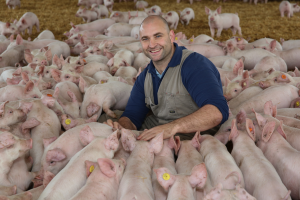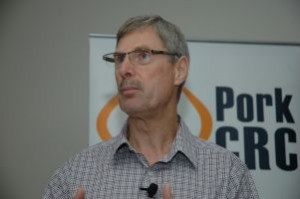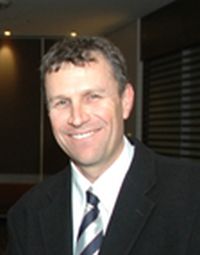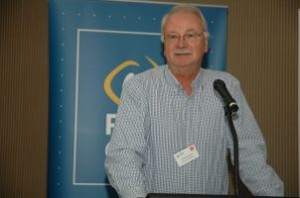Program Leader
Dr Will van Wettere
Pork CRC Program 1 Leader Dr Will van Wettere holds an honours degree in Agricultural Science (University of Edinburgh, Scotland) and a PhD focussing on reproduction of female pigs (University of Adelaide, SA).
After completing his PhD, Will was awarded a Pork CRC post-doctoral award focussing on reproduction and is now employed as a Senior Lecturer (Intensive Livestock, Pigs) at University of Adelaide’s School of Animal Science. Throughout his career Will has been fortunate to receive extensive support from Pork CRC and be involved in a wide range of CRC activities, including the CRC’s education program. Will succeeded Dr Ray King as Leader of Pork CRC Program 1 (‘Reduced confinement of sows and piglets’) on July 1 and earlier this year he replaced Professor Paul Hughes to run Pork CRC’s annual summer course at Roseworthy, ‘The Science and Practice of Pig Production’.
Transformational outcomes
Developing effective and commercially applicable strategies to mate a high proportion (85% +) of sows during lactation and produce high pregnancy rates and large litters from these sows continues to be a major objective of Program 1.
Commercial validation of a mix of existing strategies is currently being conducted at a major Australian facility and once completed the data will be made available. In addition to this, it is evident from recent Pork CRC work that strategies designed to enable mating during lactation may improve reproductive performance of those sows which remain anoestrus during lactation, but are mated post-weaning. For example, short periods of sow-piglet separation pre-weaning increased litter size of sows mated post-weaning, while group lactation in conjunction with daily boar exposure dramatically increased litter sizes of sows mated post-weaning. It is therefore possible that manipulating housing and suckling load and boar exposure pre-weaning (even if insufficient to induce a lactation mating) could improve sow reproductive output.
Grouping sows
A second major objective of Program 1 is ensuring successful grouping of sows during gestation and the Pork CRC continues to support a substantial body of work in this area, with research conducted at a number of Australian research institutes and commercial facilities.
Recent work by Pork CRC supported Emma Greenwood, as part of her PhD, indicates that increasing sow space allowance during the first four days post-mixing has the potential to reduce sow to sow aggression at mixing. Additionally, work from her PhD indicates that providing sows with enrichment during the mixing period promotes positive behaviours. In fact, there is a considerable body of work being conducted, in conjunction with commercial partners, focussing on enrichment for group housed sows.
Two major studies are investigating the impact of nutritional enrichment (enrichment blocks and straw in racks). Developing strategies to enrich the lives of sows (and indeed all pigs) which can be applied at a commercial level and achieve real benefits for the animals concerned is likely to be one of the biggest challenges facing the pig industry.
Lactation management
A third investment priority for Pork CRC has been pre-farrowing and lactation management to improve welfare of sows and piglets. To this end, Pork CRC has recently funded a collaborative project between University of Melbourne and SARDI, investigating whether spraying sows with oxytocin pre-farrowing can result in better behaved gilts during farrowing and improve piglet weaning weights. This project aligns well with ongoing similar research in this area. Specifically, there are two commercial studies investigating the impact of group lactation on piglet performance and welfare and fundamental studies are being conducted at SARDI, University of Adelaide and University of Melbourne to investigate strategies to quantify and reduce sow stress at farrowing and increase sow contentment during lactation.
The innovative research and training in Pork CRC Program 1 has been rewarding, according to Will, who reports that he is delighted to be, in his words, “right in the middle of it all’.
Dr Will van Wettere’s contact details are as follows:
School of Animal and Veterinary Sciences,
Roseworthy Campus,
University of Adelaide
South Australia, 5005
Tel: 08 8313 7911
Email: william.vanwettere@adelaide.edu.au
Subprogram Leaders
Professor George Foxcroft
Subprogram 1A: Mating and lactation innovations
2011 – 2014
Dr George Foxcroft is Professor Emeritus at The University of Alberta and President and Co-Director of KinFox Consulting Inc., specialising in the application of the science of swine reproductive biology to improvements in breeding herd management.
He obtained a First Class Honours degree in Agricultural Sciences and then a PhD in Reproductive Physiology from the University of Nottingham, England. After two years post-doc research at the University of Illinois, USA, he held a faculty position at the University of Nottingham from 1974 to 1988. During this time his research program focused on the physiology and endocrinology of the gilt and the lactating and weaned sow. During this period of research he initiated collaborations with a number of companies interested in practical applications of breeding herd management (Hoechst, Roussel and Intervet) that continued throughout his career.
George also collaborated with the late Dr Peter English and his students at the University of Aberdeen in research trails almost entirely based in the operations of large commercial producers in Aberdeenshire. While also at the University of Nottingham, George collaborated with the late Dr Des Cole to convene an Easter School on the Control of Pig Reproduction, that became the first of the four-yearly International Conferences on Pig Reproduction (ICPR).
George moved with his family to Canada in 1988 to take up an NSERC-Industry Research Chair in Swine Reproductive Physiology at The University of Alberta, sponsored by the Alberta Pork Producers Corporation. He led the Swine Reproduction Development Program at the University of Alberta until retiring in 2012, was appointed to a prestigious Canada Research Chair in Swine Reproductive Physiology 2001-2008 and was Co-Director of the NSERC EmbryoGENE Strategic Research Network 2008-20012.
He has supervised or co-supervised more than 40 PhD/MSc students, published more than 190 peer-reviewed papers/reviews and in 2012 was cited by the Globe & Mail as one of the top three researchers in Canada in the field of Agricultural Sciences, based on the H-Factor system that accounts for recorded citations by other authors of his published work. In the domain of basic research, George has served on numerous research committees, including as a member of and chairing the federal NSERC Committee in Integrated Animal Biology. In addition to his appointment as Sub-Program Leader within the current CRC for High Integrity Australian Pork, he also serves as a member of Technical Review Committee the provincial Alberta Meat & Livestock Agency (ALMA). As a research administrator, George served twice as Associate Chair (Research) in his department and was Project Leader for the development of the world class Swine Research & Technology Centre commissioned at the University of Alberta in 2001.
In addition to his peer-reviewed research, George has published more than 120 invited reviews in conference proceedings, covering the entire R & D spectrum. These reviews reflect his extensive work with pork production systems and producer-based meetings throughout in North and South America and the reputation of the Swine Research & Technology Centre at the University of Alberta for delivering a series of Swine Breeding Management Workshops involving classroom and in-barn sessions that demonstrate the latest in swine reproductive biology and breeding management. A parallel series of Swine Reproduction Workshops have also become a regular pre-conference feature of annual Leman Conferences at The University of Minnesota.
A focus on optimising breeding herd management to improve the efficiency of the breeding herd and conducting innovative research projects in a commercial setting are particularly relevant to his activities as Subprogram 1A Leader with the Pork CRC.
Contact details: Dr George Foxcroft, Email grf1@ualberta.ca
Professor John Pluske
Subprogram 1B: Innovative Weaning Systems
Professor John Pluske from the School of Veterinary and Life Sciences at Murdoch University, WA, is Leader of Pork CRC Subprogram 1B, ‘Gradual Weaning Systems’, which is investigating aspects of piglet production, health and welfare during lactation.
The subprogram presently only has a couple of small projects within it, however more investment in this program is expected as new housing and management systems in lactation that are commercially viable begin being developed in the other subprograms.
John has been involved in pig-related research since undertaking an Honours project as part of his Bachelor of Science (Agriculture) at UWA in 1987.
After a short break, this project was followed by a PhD in Animal Nutrition and Physiology, supervised by Dr Ian Williams and completed in 1993. He then spent 18 months working as a post-doctoral fellow with Professor Frank Aherne and Professor George Foxcroft at the University of Alberta, Edmonton, Canada.
While there, he investigated nutrition-reproduction interactions in sows. Ian joined him for part of this time. While the research was productive, with worthwhile outcomes, a notable highlight of this Canadian visit was John and Ian finding a bottle of Grange in a tiny bottle shop in Jasper. John fondly remembers spending many happy hours learning and working with Frank, but perhaps Frank’s wisest advice was to be home in time for supper!
John returned to WA in 1995 to work with Drs Hampson and Pethick in the School of Veterinary Science at Murdoch University, undertaking projects in pig nutrition and disease.
John and his family then moved to New Zealand in mid-1996, where he spent three years at the Monogastric Research Centre at Massey University conducting pig, poultry and companion animal research. Being also involved in extension meant travelling the length and breadth of the country speaking to farmer groups.
In June 1999, John accepted a position as Senior Lecturer in the Division of Veterinary Science back at Murdoch University. His research in nutritional digestive physiology continued, with growth and development of the young and growing pig still a focus.
The pig research environment in Australia is relatively small but is lively and dynamic and John is grateful that he can collaborate with fellow researchers, such as Drs Jae Kim and Bruce Mullan from the Department of Agriculture and Food Western Australia, and Professor Frank Dunshea from The University of Melbourne.
John also enjoys working with research and industry collaborators, here and internationally.
He believes that two successful CRC applications since 2005, together with significant support for research from Australian Pork Limited, has reinvigorated pig research in Australia and resulted in positive industry outcomes, and new research opportunities and collaborations and he looks forward to being involved in the future.
Contact details: Professor John Pluske, email J.Pluske@murdoch.edu.au
Prof Paul Hemsworth
Subprogram 1C: Management of Sows in Groups
Pork CRC Subprogram 1C leader is Professor Paul Hemsworth, Director, Animal Welfare Science Centre, University of Melbourne, a joint centre of University of Melbourne, Department of Primary Industries (Victoria) and Ohio State University (USA) with The South Australian Research and Development Institute (SARDI) and University of Adelaide joining in mid 2013. The Centre provides a focus and direction for the partner organisations’ academic and research resources in animal welfare. The Centre’s research and teaching capacity is considerable, with scientific expertise in the key disciplines of animal behaviour, psychology, stress physiology and veterinary medicine.
As Director, Paul is responsible for leading the allocated academic and research personnel of the partner organisations. There are currently 15 scientists, 20 post-graduate students and eight support staff operating within the Centre across the partner organisations.
Confinement free
As a Subprogram leader in the Co-operative Research Centre for High Integrity Australian Pork, Paul has responsibilities for the animal welfare component of Program One, Confinement-free sow and piglet management.
Subprogram 1C is about developing optimum management procedures for group housed sows, while accommodating their individual requirements for nutrition, maintenance of health and well-being.
In collaboration with the late John Barnett, Paul studied the welfare risks associated with confinement housing. This research, particularly on the effects of floor space, group size and feeding stall design on group-housed sows in the 1980s and 1990s, has provided a strong foundation for current research and industry developments as the pork industry moves away from stall housing of sows during gestation to group housing. Paul’s present and recent research continues to study design features of group housing systems that limit the welfare of group-housed sows.
Paul has had an extensive research career, studying the behaviour and welfare of farm and companion animals. He has made a substantial contribution to understanding of the behavioural and physiological responses of farm animals to modern housing, husbandry and handling practices.This has led to housing and training developments in the livestock industries to overcome behavioural and welfare problems.
Taking stock
He is internationally recognised for his research with Professor Grahame Coleman on the importance of human-animal interactions on farm animal productivity and welfare. This unique and innovative multidisciplinary research has shown that cognitive-behavioural training of stockpeople, in which the key attitudes and behaviour of stockpeople are targeted, as well as the real or perceived impediments to adoption of the behaviour, can be successfully used to improve animal welfare and productivity in livestock industries. In addition to the direct effects of the stockperson’s attitudes and behaviour on animal welfare and productivity, this research has also shown that stockperson attitudes and behaviour may also have indirect effects on animal welfare and productivity by affecting other important job-related characteristics, such as job satisfaction, work motivation and motivation to learn.
Teaching time
Paul has developed and teaches the subjects Animal Welfare and Ethics, Animals in Society and Applied Animal Behaviour to science students at an undergraduate level and the subjects Animal Welfare and Behaviour of Farm and Companion Animals at a post-graduate level at the University of Melbourne. With US Department of Agriculture funding, he has also developed at Ohio State University a series of animal welfare modules for use by animal science and veterinary science students and has assisted in introducing animal behaviour and welfare teaching at James Cook University, Townsville, Queensland.
Contact details: Professor Paul Hemsworth, email phh@unimelb.edu.au







